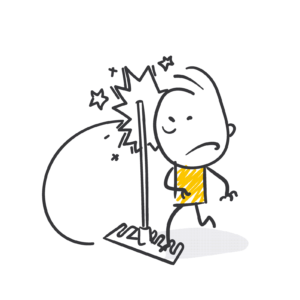“I won’t care because I’ll be dead.”
“I’m too young.”
“That won’t happen to me.”
“I’m not wealthy.”
“My family will know what to do.”
These are just a few of the rationalizations we often hear from people in our community as to why they believe they do not need an estate plan.
Once you understand exactly how planning is designed to work and what it protects against, you will realize there is no acceptable excuse for not having a plan.
The first step in creating a proper plan is to thoroughly understand the potential consequences of not having a plan at all. In the event of your death or incapacity, not having a plan could be incredibly traumatic and costly for your family, who will be forced to deal with the mess that is left behind.
While each estate and family are unique, here are some of the things most likely to happen to you and your loved ones if you fail to create a plan.
1. Your Family Will Have to Go to Court
If you do not have a plan, or if you only have a will, your family will have to go through probate court upon your death. Yes, even with a will, your estate will go through probate. In the simplest terms, probate is the legal process for determining what happens to your money and things (i.e., your “estate”) after your death. With no plan at all, probate can be a true nightmare for your loved ones, as probate is notoriously slow, costly, and public.
Depending on the complexity of your estate, probate can take months, or even years, to complete. In addition to the time it takes, probate can be expensive. In fact, once all your debts, taxes, and court fees have been paid, there might be nothing left for anyone to inherit. If there are any assets left, your family will likely have to pay hefty attorney’s fees and court costs to claim them.
Yet, the most burdensome part of probate is the frustration and anxiety it can cause your loved ones. In addition to grieving your death, planning your funeral, and contacting everyone you’re close with, your family will be stuck dealing with a crowded court system that can be challenging to navigate even in the best of circumstances. Plus, the entire affair is open to the public, which can make things even more stressful and burdensome for those you leave behind, especially if the wrong people take an interest in your family’s affairs.
That said, the expense and drama of the court system can be almost totally avoided with proper planning. With a properly funded trust, for example, we can ensure that your assets pass directly to your family upon your death, without the need for any court intervention. If you plan properly, just about everything can happen in the privacy of your family’s home and on your family’s time.
2. You Have No Control Over Who Inherits Your Assets
If you die without a plan (called “intestate”), the court will decide who inherits your assets, and this can lead to all sorts of problems. Rather than following your wishes had you planned ahead, the probate court will follow Florida’s laws of intestate succession to determine who is entitled to your property. These intestate laws hinge largely upon whether you are married and if you have children.
Spouses and children are given top priority, followed by your other closest living family members. If you are single with no children, your assets typically go to your parents and siblings, and then more distant relatives if you have no living parents or siblings. If no living relatives can be located, your assets go to the State of Florida.
Fortunately, you can change all of this with a plan and ensure your assets pass to whom you want, when you want, and how you want. It is important to note that Florida’s intestacy laws only apply to blood relatives, so unmarried partners and/or close friends would get nothing. If you want someone outside of your family to inherit your property, having a plan is an absolute must.
If you are married with children and die with no plan, it might seem like things would go smoothly, but that is not always the case. If you are married but have children from a previous relationship, for example, the court could give everything to your current spouse and leave out your children from the previous relationship. In another instance, you might be estranged from your children or not trust them with money, but without a plan, state law controls who gets your assets, not you.
Passing away without a plan could also cause your surviving family members to get into an ugly court battle over who has the most right to your property. Likewise, if you become incapacitated, your loved ones could get into conflict over your medical care. You may think this would never happen with your loved ones, but we see families torn apart from a loved one’s failure to plan all the time, even when there is little financial wealth involved.
We can help you create a plan that handles your assets and your care in the exact manner you wish, taking into account all of your family dynamics. This way, your death or incapacity will not be any more painful or expensive for your family than it needs to be.
Stay tuned for my next blog post where I will discuss the last two reasons why you should have a plan in place and the consequences of failing to plan ahead. >>> Click here to read Part 2!
Work with us
At Jacob & Greenfield, PLLC, we will personally guide you through the planning process to ensure you take all the necessary precautions to spare your loved ones from needless frustration, conflict, and expense. Additionally, putting a proper plan in place will give you the peace of mind that comes from knowing your loved ones will be provided and cared for no matter what happens to you.
Schedule a no-cost initial consultation with us, so you can finally check this important task off your to-do-list.









